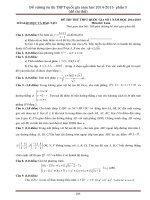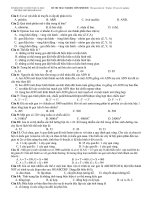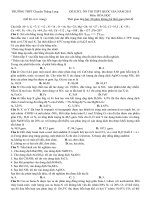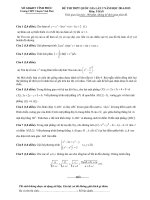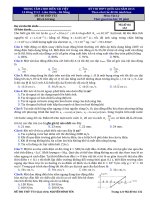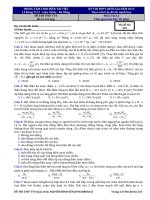Tải Đề thi thử THPT Quốc gia năm 2017 môn Tiếng Anh có đáp án - Đề 78 - Đề thi thử Đại học môn Tiếng Anh năm 2017 có đáp án
Bạn đang xem bản rút gọn của tài liệu. Xem và tải ngay bản đầy đủ của tài liệu tại đây (141.88 KB, 6 trang )
<span class='text_page_counter'>(1)</span><div class='page_container' data-page=1>
<b>SỞ GIÁO DỤC VÀ ĐÀO TẠO YÊN BÁI</b>
<b>TRƯỜNG THPT NGUYỄN LƯƠNG BẰNG </b>
<i> (Đề thi có 05 trang)</i>
<b>KỲ THI THPT QUỐC GIA NĂM 2017 </b>
<b>Môn: TIẾNG ANH</b>
<i>Thời gian làm bài: 60 phút, không kể thời gian phát đề</i>
<b>Đề: 5</b>
<i><b>Mark the letter A, B, C, or D on your answer sheet to indicate the word whose underlined part</b></i>
<i><b>differs from the other three in pronunciation in each of the following questions. </b></i>
<b>Question 1: A. breathing</b> B. ethane C. thank D. healthy
<b>Question 2: A. school</b> B. blood C. choose D. bamboo
<i><b>Find the word marked A, B, C, or D with the stress pattern different from that of the other three</b></i>
<i><b>words in each question. </b></i>
<b>Question 3: A. commuter </b> B. compliance C. competent D. computer
<b>Question 4: A. comfortable </b> B. compliment C. competence D. companion
<i><b>Identify the one underlined word or phrase marked A, B, C, or D that must be changed in order for</b></i>
<i><b>the sentence to be correct. </b></i>
<b>Question 5: Get in touch with me when you need my help. You’ve got my phone number and </b>
A B C
address, have you?
D
<b>Question 6: A warning printed on a makeshift lifebuoy says: "This is not a life-saving device. </b>
A
Children should be accompany by their parents.
B C D
<b>Question 7: Polio, one of a group of spinal inflammations, causes fever and paralysis often </b>
A B
resulting in disabled and deformity.
C D
<i><b>Mark the letter A, B, C, or D on your answer sheet to indicate the correct answer to each of the</b></i>
<i><b>following questions.</b></i>
<b>Question 8: Mr Brown still hasn’t really ____________________ the death of his wife. </b>
A.got over B. taken after C. turned up D. looked after
<b>Question 9: I’m_____________ of her moaning about the job, if she doesn’t like it she should leave. </b>
A. clean and tidy B. high and dry C. sick and tired D. prim and proper
<b>Question 10: His doctor advised him to_____________ himself to three cigarettes a day. </b>
A. border B. cage C. limit D. keep
<b>Question 11: Books are still a cheap way to get information and ______________, and you can kêp a </b>
book forever and read it many times.
A. entertain B. entertainment C. entertaining D. responsibility
<b>Question 12: She worked really hard this year so she was given a 10% pay_____________.</b>
A. inflation B. extra C. decrease D. increase
<b>Question 13: ________________is played in a pool with a goal above the water</b>
A. Swimming B. Scuba-diving C. Water polo D. Wind-surfing
<b>Question 14: WHO stands for _____________________ .</b>
A. World Health Organization B. World Healthy Organization
C. World Healthily Organization D. World Health Organizations
<b>Question 15. Hoang Xuan Vinh, the first athlete of Viet Nam in ________________ event, won the </b>
gold medal in the Olympic Rio 2016.
</div>
<span class='text_page_counter'>(2)</span><div class='page_container' data-page=2>
<b>Question 16. We _________ today and I got into trouble because I hadn't done it.</b>
A. had checked our homew B. had our homework checked
C. were checked our homework D. have our homework checking
<b>Question 17. People can become very __________ when they are stuck in traffic for a long time.</b>
A. nervous B. bad-tempered C. stressful D. pressed
<b>Question 18. As a millionaire who liked to show off her wealth, Mrs. Smith paid ______ we asked.</b>
A. four times much as B. four time as many as C. four times as much as D. four time much than
<b>Question 19:In the past, many people considered women to be better suited for ________________ </b>
and homemaking rather than for involvement in the public life of business or politics.
A. childbearing B. civilization C. employment D. political rights
<b>Mark the letter A, B, C, or D on your answer sheet to indicate the most suitable response to </b>
<b>complete each of the following exchanges.</b>
<b>Question 20: - Tom: “I thought your performance last Sunday was wonderful.” </b>
<b> - Laura: “_____________________” </b>
A. I completely agree with you. It was terrific.
B. No doubt!
C. Don’t tell a lie. I thought it was terrible.
D. You must be kidding. It was not as good as I had expected.
<b>Question 21: - Jenny: “Thank you very much for your donation, Mr. Robinson.” </b>
<b> - Mr. Robinson: “______________________” </b>
A. Delighted I was able to help B. I see.
C. You are right D. You can say that again.
<i><b>Mark the letter A, B, C or D on your answer sheet to indicate the word(s) SIMILAR in meaning to</b></i>
<i><b>the underlined word(s) in each of the following questions. </b></i>
<i><b>Question 22: I just want to stay at home and watch TV and take it easy</b><b> . </b></i>
A. sleep B. sit down C. eat D. relax
<i><b>Question 23: The bomb went off with a loud bang which could be heard all over the town.</b></i>
A. delayed B. exploded C. arrived D. recovered from
<b>Mark the letter A, B, C, or D on your answer sheet to indicate the word or phrase that is</b>
<b>OPPOSITE in meaning to the underlined part in each of the following questions.</b>
<b>Question 24: They have not made any effort to integrate with the local community.</b>
A. cooperate B. seperate C. depreciate D. induce
<b>Question 25: During the five- decade history the Asian Games have been advancing in all aspects.</b>
<b> A. holding at</b> <b>B. holding back</b> <b>C. holding to</b> D. holding by
<i><b>Mark the letter A, B, C, or D on your answer sheet to indicate the sentence that is closest in</b></i>
<i><b>meaning to each of the provided italicized ones.</b></i>
<b>Question 26. Bali has far better beaches than Java, which make it more attractive to tourists.</b>
<b>A. Bali is more popular with tourists because it has more beaches than Java.</b>
<b>B. Bali attracted more tourists than Java because its beaches are much farther.</b>
<b>C. Tourists prefer the beaches in Bali to those in Java because they are far better.</b>
<b>D. Bali is more popular with tourists because its beaches are much better than those of Java</b>
<b>Question 27. “Send this urgent document immediately!” the officer told the soldier.</b>
A. The officer requested that the soldier rush out due to the document’s urgency.
B. The officer ordered the soldier to deliver the urgent document instantly.
C. The officer recommended the soldier leave right away because of the urgent document.
D. The officer advised the soldier to send the urgent document right away.
</div>
<span class='text_page_counter'>(3)</span><div class='page_container' data-page=3>
B. The organization where Kate works for collects money to help orphans.
C. The organization for that Kate works collects money to help orphans.
D. Money of orphans is collected in the organization where Kate works.
<b>Mark the letter A, B, C, or D on your answer sheet to indicate the sentence that best </b>
<b>combines each pair of sentences in the following questions.</b>
<b>Question 29. Viet Nam exports a lot of rice. It is grown mainly in the South of the country.</b>
A.Viet Nam exports a lot of rice which grown mainly in the South of the country.
B. Viet Nam exports a lot of rice grown mainly in the South of the country.
C. Viet Nam exports a lot of rice which is growing mainly in the South of the country.
D. Viet Nam exports a lot of rice, that is grown mainly in the South of the country.
<b>Question 30. John didn’t pass the GCSE examination, so he wasn’t allowed to take the entrance</b>
<b>examination to the university.</b>
A. If John passed the GCSE examination, he would be allowed to take the entrance
examination to the university.
B. If John hadn’t passed the GCSE examination, he would have been allowed to take the
entrance examination to the university.
C. If John had passed the GCSE examination, he would have been allowed to take the
entrance examination to the university.
D. If John didn’t pass the GCSE examination, he would be allowed to take the entrance
examination to the university.
<i><b>Read the following passage and mark the letter A, B, C, or D on your answer sheet to indicate the</b></i>
<i><b>correct word or phrase that best fits each of the numbered blanks from 31 to 35</b></i>
<b>THE HISTORY OF WRITING</b>
The development of writing (31) ___ a huge difference to the world and might see it as the
beginning of the media. Pieces of pottery with marks on that are probably numbers have been
discovered in China that date from around 4000 BC. Hieroglyphics and other forms of "picture
writing" developed in the (32)_____ around Mesopotamia (modern-day Iraq), where the ancient
Sumerian civilization was based, from around 3300 BC onwards. However, the first true alphabet was
used by the Phoenicians around 1050 BC. Their alphabet had 22 letters and it is estimated that it lasted
for 1000 years. The first two signs were called "aleph" and "beth", which in Greek became "alpha" and
"beta", which gave us the modern word "alphabet"The modern European alphabet is based on the
Greek and (33) ____ to other European countries under the Romans. A number of changes took place
as time passed. The Romans added the letter G, and the letter J and V were (34) ____ to people in
Shakespeare's time.If we (35)____ the history of punctuation, we also find some interesting facts.
Question 31. A. did B. had C. made D. took
Question 32. A. distance B. area C. length D. earth
Question 33. A. spread B. appeared C. was D. occurred
Question 34. A. infamous B. unpopular C. unknown D. hidden
Question 35. A. look into B. bring on C. make off D. hold up
<b>Read the following passage and mark the letter A, B, C, or D on your answer sheet to indicate the </b>
<b>correct answer to each of the questions from 36 to 42.</b>
The World Wide Fund for Nature (WWF) is an international non governmental organization
for the conservation, research, and restoration of the environment. The organization was formed as a
<i>charitable trust on September 11, 1961, in Morges, Switzerland, under the name World Wildlife Fund.</i>
It was an initiative of Julian Huxley and Max Nicholson.
</div>
<span class='text_page_counter'>(4)</span><div class='page_container' data-page=4>
The group says its mission is "to halt and reverse the destruction of our environment".
Currently, much of its work focuses on the conservation of three biomes that contain most of the
<b>world's biodiversity: forests, freshwater, ecosystems, and oceans and coasts. Among other issues, it is</b>
also concerned with endangered species, pollution, and climate change. The organization runs more
than 20 field projects worldwide. In the last few years, the organization set up offices and operations
around the world.
<b>Question 36. The World Wild Fund for Nature (WWF) is concerned with________________</b>
A. industry B. humanity C. atmosphere D. environment
<b>Question 37. WWF is now working in about ________________</b>
A. nineteen countries B. one hundred countries and territories
C. ninety countries D. sixty- nine countries and states
<b>Question 38. Nine percent of WWF funding comes from _________________</b>
A. governments all over the world B. private individuals and businesses
C. the United States D. Canada
<b>Question 39. The word “ issues’’ in passage is closest in meaning to _______________</b>
A. problems B. ideas C. groups D. missions
<b>Question 40. Which of the following statements is NOT true ?</b>
A. WWF is a non- governmental organization
B. Its name in the United States and Canada is different
C. WWF focuses on conservation of forests
D. WWF is also concerned with climate change
<b>Question 41. World Wild Fund for Nature focuses on the following fields, EXCEPT……….</b>
A. endangered species B. climate change C. security D. ecosystems
<b>Question 42. What is WWF’s main objective?</b>
A. to protect wildlife B. to protect the environment
C. to halt and reserve the environmental destruction D. to make research
<b>Read the following passage and mark the letter A, B, C, or D on your answer sheet to indicate </b>
<b>the correct answer to each of the questions from 43 to 50.</b>
For more than six million American children, coming home after school means coming back to
<i><b>an empty house. Some deal with the situation by watching TV. Some may hide. But all of them have</b></i>
<i><b>something in common. They spend part of each day alone. They are called “latchkey children”. They</b></i>
are children who look after themselves while their parents work. And their bad condition has become a
subject of concern.
Lynette Long was once the principal of an elementary school. She said, “We had a school rule
against wearing jewelry. A lot of kids had chains around their necks with keys attached. I was
constantly telling them to put the keys inside shirts.
There were so many keys; it never came to my mind what they meant.” Slowly, she learned
that they were house keys. She and her husband began talking to the children who had keys. They
learned of the effect working couples and single parents were having on their children. Fear was the
biggest problem faced by children at home alone. One in three latchkey children the Longs talked to
reported being frightened.
Many had nightmares and were worried about their own safety. The most common way
latchkey children deal with their fears is by hiding. They may hide in a shower stall, under a bed or in
a closet. The second is TV. They often turn the volume up. It’s hard to get statistics on latchkey
children, the Longs have learned. Most parents are slow to admit that they leave their children alone.
<i><b>Question 43: The phrase “an empty house” in the passage mostly means________. </b></i>
A. a house with no people inside B. a house with no furniture
C. a house with nothing inside D. a house with too much space
<b>Question 44: One thing that the children in the passage share is that________. </b>
A. they all watch TV B. they spend part of each day alone
C. they are from single-parent families D. they all wear jewelry
</div>
<span class='text_page_counter'>(5)</span><div class='page_container' data-page=5>
A. are also found in middle-class families B. watch too much television during the day
C. suffer a lot from being left alone D. are growing in numbers
<b>Question 46: Why did a lot of kids have chains around their necks with keys attached? </b>
A. They had to use the keys to open school doors.
B. Schools didn’t allow them to wear jewelry, so they wore keys instead.
C. They were fully grown and had become independent.
D. They would use the keys to enter their houses when they came home.
<b>Question 47: What do latchkey children suffer most from when they are at home alone? </b>
A. Fear. B. Tiredness. C. Boredom. D. Loneliness.
<b>Question 48: Lynette Long learned of latchkey children’s problems by________. </b>
A. visiting their homes B. delivering questionnaires
C. interviewing their parents D. talking to them
<b>Question 48: What is the most common way for latchkey children to deal with fears? </b>
A. Hiding somewhere. B. Talking to the Longs. C. Having a shower. D. Lying under a TV.
<b>Question 50: It’s difficult to find out the number of latchkey children because________. </b>
A. most parents are reluctant to admit that they leave their children alone
B. they do not give information about themselves for safety reasons
C. they hide themselves in shower stalls or under beds
D. there are too many of them in the whole country
</div>
<span class='text_page_counter'>(6)</span><div class='page_container' data-page=6>
<b>ĐÁP ÁN ĐỀ THI TỐT NGHIỆP THPTQG NĂM 2017 – ĐỀ 5</b>
STT
MÃ 276
STT
MÃ 276
STT
MÃ 276
STT
MÃ 276
1
A
16
B
31
C
46
D
2
B
17
B
32
B
47
B
3
C
18
C
33
A
48
D
4
A
19
A
34
C
49
A
5
D
20
D
35
A
50
A
6
C
21
A
36
D
7
D
22
D
37
C
8
A
23
B
38
B
9
C
24
B
39
A
10
C
25
B
40
B
11
B
26
D
41
C
12
D
27
B
42
C
13
C
28
A
43
A
14
A
29
B
44
B
</div>
<!--links-->
